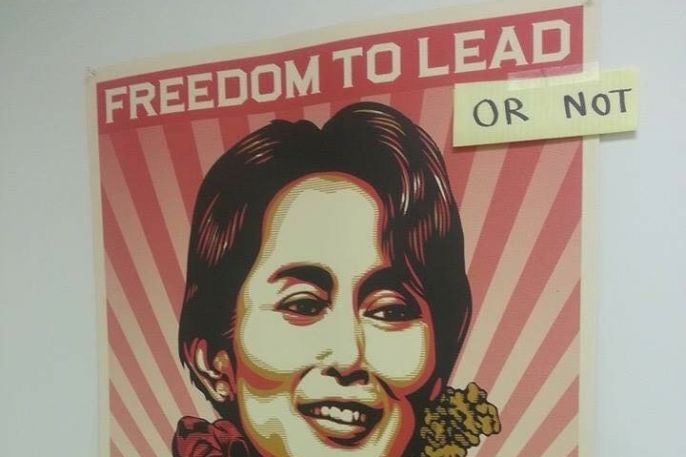Nine months into the National League for Democracy government’s term in office, the human rights situation in Burma has improved only marginally, and in some cases even backslid, according to New York-based Human Rights Watch’s annual report for 2016.
HRW’s World Report 2017, released on Thursday and covering the human rights practices of more than 90 countries, acknowledged constraints on the NLD government due to the military’s constitutionally enshrined powers, but urged the Suu Kyi administration to more assertively fight for human rights.
The report noted shortcomings in the protection of free speech, and women’s and children’s rights last year, as well as highlighted deteriorating circumstances for Rohingya Muslims in Arakan State in recent months and an escalation in conflict between the Burma Army and several ethnic armed groups, despite the signing of a so-called nationwide ceasefire agreement in October 2015.
“The government’s continuing attacks on religious and ethnic minorities and arrests of political activists are uncomfortably reminiscent of the ‘bad old days’ in Burma,” HRW’s Asia director, Brad Adams, was quoted as saying in a press release accompanying the report’s release. “Foreign governments should press Aung San Suu Kyi to call on all sections of the government to promote respect for human rights so that needed reforms can be realized.”
The government of Burma’s de facto leader Suu Kyi was sworn in on March 30, inheriting some of the levers of power in a country long in HRW’s crosshairs as a serial violator of human rights under successive military regimes.
This year’s report gave a nod to the early promise of her government, with the release of more than 200 political prisoners in April, but added, “Nonetheless, the NLD-led government has thus far not capitalized on its initial momentum in guiding the country toward substantive reform or the creation of democratic institutions.”
The report conceded that the existing “constitutional empowerment of the military, repressive legislation, weak rule of law, and a corrupt judiciary” were all inherited challenges inhibiting such reform.
But in conflict zones in Kachin, Karen, Arakan and Shan states, fighting this year between the Burma Army and ethnic armed groups further imperilled civilians, nearly 220,000 of whom are displaced nationwide, the report noted.
“Government forces have been responsible for serious abuses, including extrajudicial killings, torture, sexual violence, and destruction of property,” it said, adding that the NLD had failed to hold perpetrators of these abuses to account.
Long-running conflicts have actually intensified in Kachin and Shan states in 2016, dealing a serious blow to Suu Kyi’s stated top priority, nationwide peace.
A different and growing crisis in northern Arakan State — where deadly 9 October attacks on border police that the government has pinned on Islamic militants was met with a swift and violent security crackdown — “represents the most serious and widespread violence against the Rohingya” since communal violence tore through the state in 2012, the report said.
On free speech, HRW criticised continuing, politically motivated prosecutions and a failure to act legislatively.
“Restrictions on the rights to freedom of expression and assembly persist, amid the government’s failure to contend with the range of rights-abusing laws that have been long used to criminalize free speech and prosecute dissidents,” its report said.
Prosecutions of cases of electronic defamation under article 66(d) of the Telecommunications Law have soared under the NLD government: Seven were brought before the courts since its passage in 2013 through the transfer of power in March 2016, with at least 38 filed in the first nine months of the NLD administration.
[related]
Phil Robertson, deputy director of the HRW Asia division, told DVB that in addition to working through parliament to dismantle repressive legislation, “the NLD should recognize that their continued silence is being interpreted around the world as complicity in the grave human rights abuses being perpetrated by the security forces … and Aung San Suu Kyi needs to employ her bully pulpit to explain how the military’s systematic abuse of rights undermines her initiatives to achieve national peace and reconciliation.”
HRW has repeatedly sought meetings with Suu Kyi to no avail, he said, adding that “it appears that she is actively avoiding any meeting with Human Rights Watch, which is very disconcerting given the significant amount of time and effort we expended to demand her release when she was under house arrest by the SLORC [State Law and Order Restoration Council], and later, the SPDC [State Peace and Development Council] military government.”



